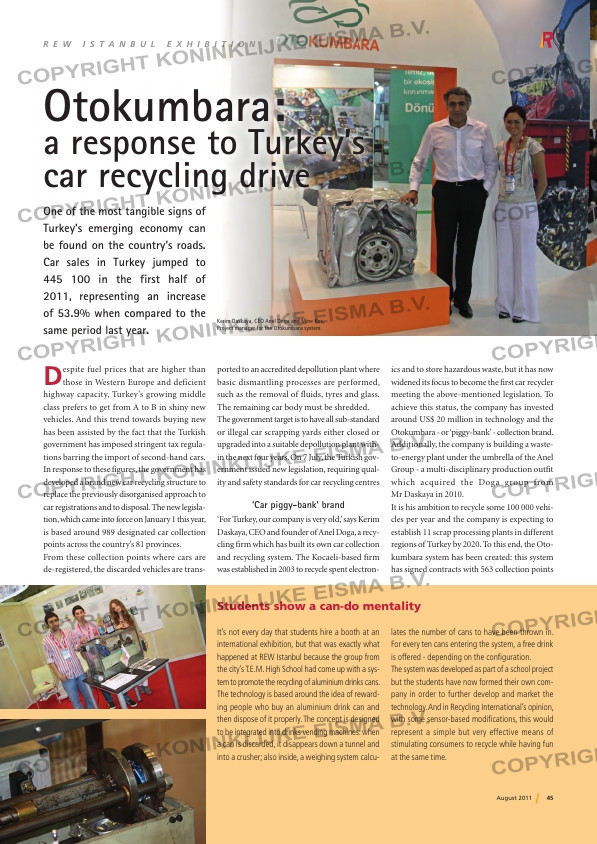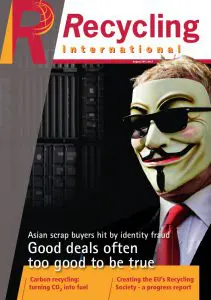Page 45 from: August 2011

45August 2011
R E W I S T A N B U L E X H I B I T I O N
Despite fuel prices that are higher than those in Western Europe and deficient
highway capacity, Turkey’s growing middle
class prefers to get from A to B in shiny new
vehicles. And this trend towards buying new
has been assisted by the fact that the Turkish
government has imposed stringent tax regula-
tions barring the import of second-hand cars.
In response to these figures, the government has
developed a brand new car recycling structure to
replace the previously disorganised approach to
car registrations and to disposal. The new legisla-
tion, which came into force on January 1 this year,
is based around 989 designated car collection
points across the country’s 81 provinces.
From these collection points where cars are
de-registered, the discarded vehicles are trans-
ics and to store hazardous waste, but it has now
widened its focus to become the first car recycler
meeting the above-mentioned legislation. To
achieve this status, the company has invested
around US$ 20 million in technology and the
Otokumbara – or ‘piggy-bank’ – collection brand.
Additionally, the company is building a waste-
to-energy plant under the umbrella of the Anel
Group – a multi-disciplinary production outfit
which acquired the Doga group from
Mr Daskaya in 2010.
It is his ambition to recycle some 100 000 vehi-
cles per year and the company is expecting to
establish 11 scrap processing plants in different
regions of Turkey by 2020. To this end, the Oto-
kumbara system has been created: this system
has signed contracts with 563 collection points
Otokumbara:
a response to Turkey’s
car recycling drive
One of the most tangible signs of
Turkey’s emerging economy can
be found on the country’s roads.
Car sales in Turkey jumped to
445 100 in the first half of
2011, representing an increase
of 53.9% when compared to the
same period last year.
Kerim Daskaya, CEO Anel Doga and Mine Koc,
Project manager for the Otokumbara system.
ported to an accredited depollution plant where
basic dismantling processes are performed,
such as the removal of fluids, tyres and glass.
The remaining car body must be shredded.
The government target is to have all sub-standard
or illegal car scrapping yards either closed or
upgraded into a suitable depollution plant with-
in the next four years. On 7 July, the Turkish gov-
ernment issued new legislation, requiring qual-
ity and safety standards for car recycling centres
‘Car piggy-bank’ brand
‘For Turkey, our company is very old,’ says Kerim
Daskaya, CEO and founder of Anel Doga, a recy-
cling firm which has built its own car collection
and recycling system. The Kocaeli-based firm
was established in 2003 to recycle spent electron-
It’s not every day that students hire a booth at an
international exhibition, but that was exactly what
happened at REW Istanbul because the group from
the city’s T.E.M. High School had come up with a sys-
tem to promote the recycling of aluminium drinks cans.
The technology is based around the idea of reward-
ing people who buy an aluminium drink can and
then dispose of it properly. The concept is designed
to be integrated into drinks vending machines: when
a can is discarded, it disappears down a tunnel and
into a crusher; also inside, a weighing system calcu-
lates the number of cans to have been thrown in.
For every ten cans entering the system, a free drink
is offered – depending on the confi guration.
The system was developed as part of a school project
but the students have now formed their own com-
pany in order to further develop and market the
technology. And in Recycling International’s opinion,
with some sensor-based modifi cations, this would
represent a simple but very effective means of
stimulating consumers to recycle while having fun
at the same time.
Students show a can-do mentality
p042_REW Turkije.indd 45 08-08-11 14:21



